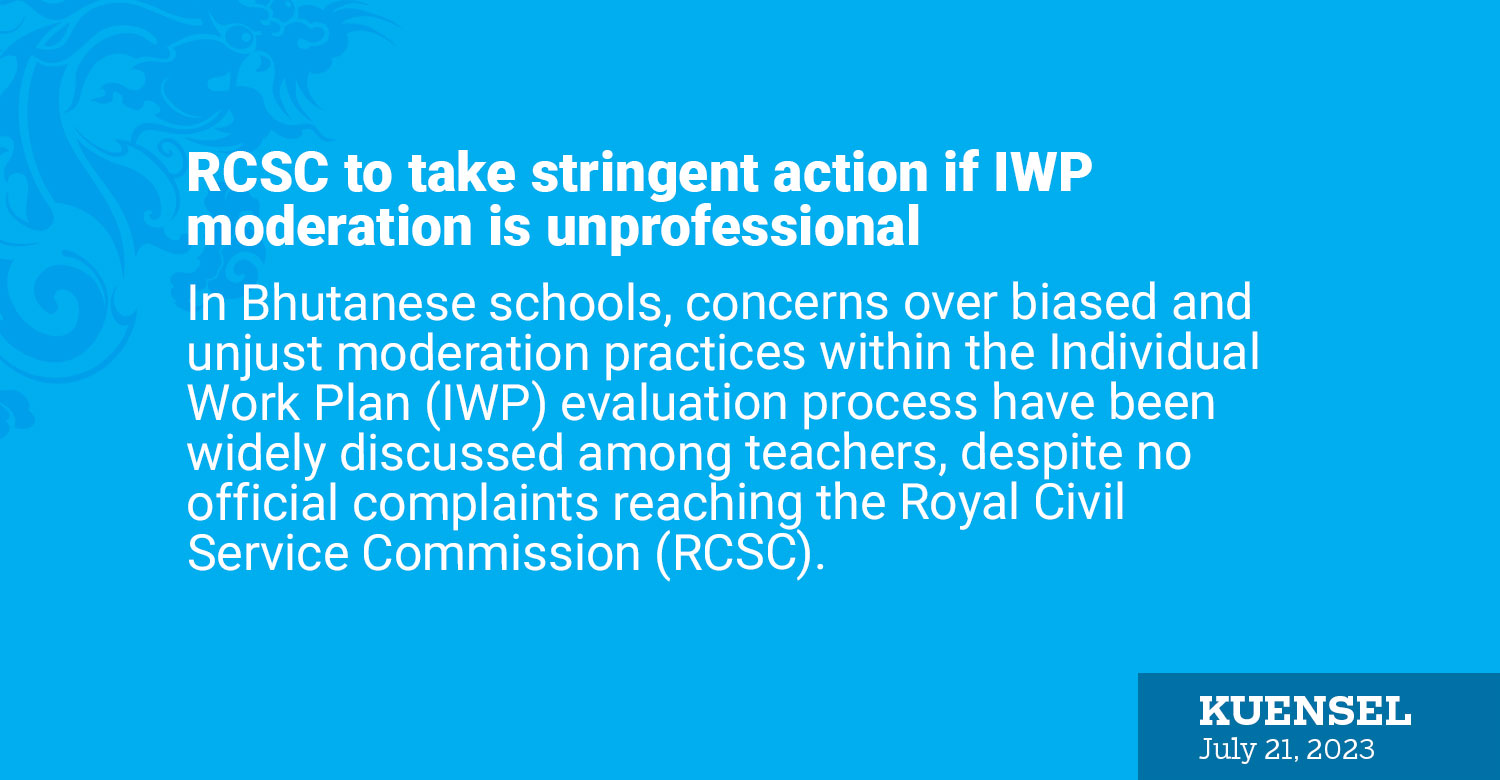KP Sharma
In Bhutanese schools, concerns over biased and unjust moderation practices within the Individual Work Plan (IWP) evaluation process have been widely discussed among teachers, despite no official complaints reaching the Royal Civil Service Commission (RCSC).
While efforts were made to bring positive changes through the implementation of the MaX performance evaluation system, persistent challenges continue to afflict the education system, especially for teachers.
In preparation for IWP moderation, teachers have adopted a customary practice of meticulously documenting their year-long work evidence to avoid being rated as partially meeting expectations (PME). The moderation exercise, overseen by the school principal, assesses four specific areas: the IWP, job size, degree of impact, and recognition.
While most teachers understand the importance of holding employees accountable through the IWP, they express dissatisfaction with the other evaluation criteria, which they believe lead to unjust and biased assessments, making their profession a burdensome one.
Teachers argue that those with insufficient work evidence become targets for the PME category during moderation. To bolster their evidence, many teachers undertake additional voluntary work outside of their primary responsibilities.
Activities such as site beautification, construction, gardening, and painting are carried out during weekends and after office hours to make their efforts more visible and impactful.
Unfortunately, this focus on avoiding PME ratings can divert attention from other essential areas and compromise core responsibilities. Some teachers have reported that the existing assessment tool for IWP has fostered favouritism and nepotism within schools.
Part of the issue stems from principals’ inadequate monitoring of subordinates, relying heavily on evidence submitted by individuals instead of actively supervising and evaluating their performance.
Moreover, the criteria for academic results, which depend on school performance, create divisions between teachers responsible for home and board examinations. Teachers feel the system favours those teaching home examinations, leading to stress and challenges for those teaching terminal classes.
Another point of contention is the requirement for minimum instructional hours or the number of periods per week. Some teachers find it unfair, as they are unable to fulfill the specified hours due to either excessive subject teachers or subjects that don’t require as much time.
In response to these concerns, the RCSC’s Leadership and Talent Division acknowledged the ongoing challenges with implementing agencies and communication issues contributing to the burden of IWP for teachers.
While the commission encourages authorities to focus on mandated responsibilities, it denies that IWP enforces civil servants to work beyond their primary duties.
Regarding fraudulent practices within the moderation committees, the RCSC asserts that no official complaint has been lodged, but internal issues have been addressed.
The commission calls on civil servants to report such practices, promising to investigate and take necessary action against the defaulters.
For the academic year 2022, out of 9,445 teachers, 195 were identified under the NI (Needs Improvement) category. The RCSC received five appeals regarding moderation results, with individuals expressing concerns over lack of transparency of criteria and clarity on job responsibilities.
To address the issue, individuals rated in PME will be reviewed by relevant supervisors and HR services, with targeted interventions such as setting clear Key Performance Indicators (KPIs) and providing support and capacity building where needed.
The challenges surrounding IWP moderation and biased evaluation underscore the importance of addressing these issues to ensure a fair and supportive environment for Bhutan’s hardworking and dedicated teachers.


